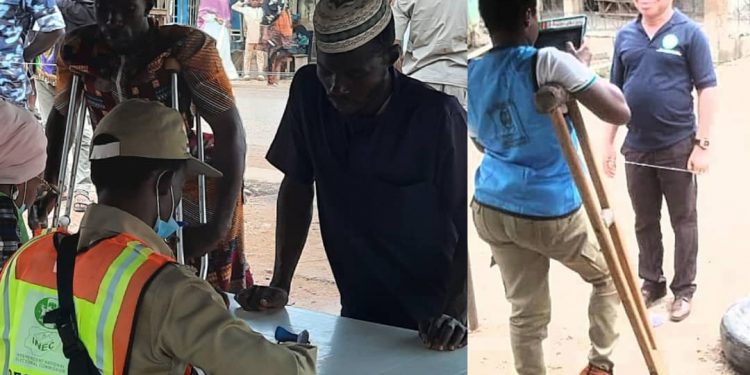The Osun State Gubernatorial Election which was held on Saturday, July 16, 2022, has been commended by election observers and relevant stakeholders to be disability-inclusive with an increased provision which aided the smooth participation of Persons with Disabilities (PWDs) in the electoral process.
Organizations of Persons with Disabilities (OPDs) involved in election monitoring have in the past lamented about different factors which stand as barriers that have continued to prevent PWDs from participating effectively in the electoral process.
Some of the barriers include; the non-provision of assistive devices for PWDs; ballot braille guide for visually impaired voters, magnifying glasses for persons with albinism and persons with low vision; instructional materials or sign language interpreters for Deaf persons; non-accessible polling units which deter persons with physical disabilities to access the voting cubicle; and non-prioritization of PWDs which leave them on the queue for a long time.
During the Edo and Ondo States Gubernatorial Elections in September and October 2020 respectively, the Inclusive Friends Association noted that there were insufficient magnifying glasses at most Polling Units and that voting centers were inaccessible for persons with physical disabilities.
Likewise, the Campaign for Equal Voting Access for Persons with Disabilities (EVAPWD) had lamented the non-provision of assistive devices for PWDs during the recently concluded Ekiti Gubernatorial election in June 2022.
Thus, non-provision of assistive devices and inaccessible polling units (PUs) have become a regular factor in the electoral process, until the Osun State 2022 Gubernatorial election. However, the level of disability inclusion experienced in the Osun State Gubernatorial election seems to be more holistic.
Deployment of PWDs as INEC Ad-hoc staff
A few days before the election, the INEC Chairman, Professor Mahmood Yakubu, disclosed that the electoral umpire will deploy 35 PWDs as ad-hoc staff for the election.
Prof Yakubu explained that the PWDs were members of the National Youth Service Corps (NYSC) to be deployed as ad hoc staff for the election and noted that it would be the first election in which INEC is deploying PWDs as ad hoc staff.
He mentioned that thirty-five (35) serving NYSC members with one form of disability or another have been identified, trained, and engaged as ad hoc staff at the polling unit level.
In PU 008, Ward 5, Osogbo LGA, a female corps member with a physical disability was engaged as an Assistant Presiding Officer (APO) during the election.
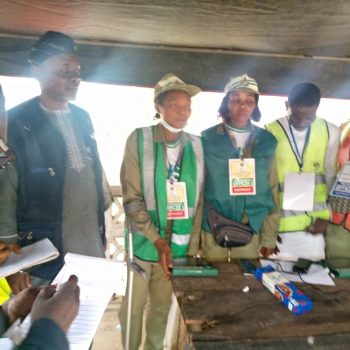
Another Corp member with disability was also posted to Registration Area 07 in Olode, Ife South LGA.
A PWD ad-hoc staff also served at PU 14, Ward 7, Ede North Local Government.
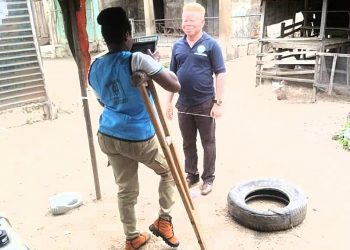
Though all the 35 PWDs deployed by INEC were not sighted by this reporter, it is evident that they were posted to different locations across the state.
PWDs as Party Agents
PWDs were sighted in numerous polling units observed by the reporter, and it is worthy to note that, beyond functioning as voters and ad-hoc staff, PWDs were also engaged as Party agents.
Mr. Rasheed Ayoola, a physically challenged man served as the party agent for the All People’s Movement in PU10, Ataojo C, Osogbo LGA.
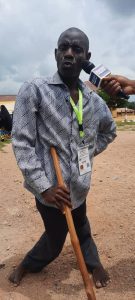
Priority voting
PWDs that were engaged across all the polling units reported that they were given priority voting. Apart from PWDs, the elderly were also given priority voting, and they had a separate queue in some places, which fast-tracked their voting process.
Mr. Orisatola Anuoluwapo, a man with a physical disability was the second person to cast his vote at PU 008, Alajue 1, Ede South. The first person was also a PWD, affirming that priority voting was given to PWDs.
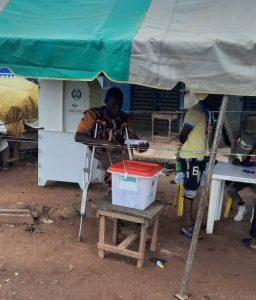
Bolatito Odeniyi, a physically challenged woman in PU 14, Ward 10 Olofinmo, Ejigbo acknowledged that she was given priority voting access immediately after she got to her PU. She also described the PU as an accessible venue, which aided in a smooth voting exercise for herself and 3 other PWDs at the PU.
Likewise, Mr. Mudasiru Adams Jibola in PU1 Ward 4, Isale Oba, Iwo LGA confirmed that he didn’t have to wait in the queue before he cast his vote.
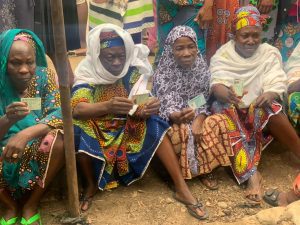
Provision of Assistive Devices
Yiaga Africa, one of the monitoring groups in the Osun State Gubernatorial election, in its findings said it observed the presence of assistive materials for PWDs in some polling units and improved the set-up of polling units to enable access for persons with a physical disability.
The group also revealed that “the braille ballot guides were observed in 60% of polling units, the PWD poster was seen in 71% of polling units and PWD voter information and statistics were seen in 79% of polling units.
Also, EVAPWD confirmed an improvement in the distribution of assistive devices, saying it observed the deployment of Braille guides, shade and magnifying glasses in the significant number of the PUs visited. “In particular, PU 8, Ward 10 0din-Oti LGA, PU 4, Ward 10, Ede South LGA, and others were seen with assistive devices for PWDs.”
Corroborating the findings of the election monitoring groups, Mr. Salawu Abiodun, a visually impaired voter in PU 4, Malete Quarters, Araromi, Iwo, shared that the braille ballot guide was available for him in his polling unit.
He noted that the venue was accessible for other PWDs, especially those with physical disabilities.
Also, Mr. Aghanti Sunday Smith, a man with albinism was able to cast his vote with the use of a magnifying glass at PU 14, Ward 7, Ede North LGA.
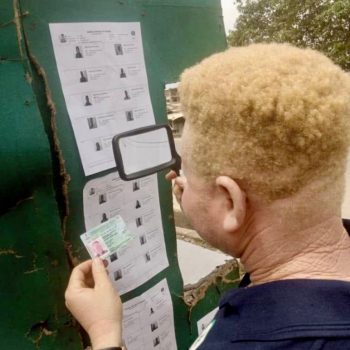
The Exceptions
Despite the commendations recorded for INEC in its level of inclusiveness, there are some shortcomings recorded in some polling units across the state.
For instance, Yiaga Africa reported that in 29% of polling units, individuals had to climb steps to access the polling units, which made it difficult for persons with disabilities.
EVAPWD had expressed its dissatisfaction that a significant number of PUs observed were not accessible. “Notably, PU 9, Ward 3 in Boripe LGA was not accessible as it was too high and filled with steps and grasses. Also, PU 4, Ward 10, Ede South LGA; PU 8, Ward 5, Ede South; PU 8, Ward 10 in Odo- Otin were sited across gutters.
“Also not accessible is PU 2, Ward 9, and its environs in Aiyedire LGA were polling units were sited across gutters or in schools with steps and high pavements. What this means is that voters with a physical disability would struggle much more to cast their votes.”
Likewise, Mr. Mudasiru Adams Jibola in PU1 Ward 4, Isale Oba, Iwo LGA noted that his PU was not accessible for PWDs, and nor were their assistive devices for PWDs.
Looking forward to 2023
While the Osun 2022 gubernatorial election has recorded a high level of disability-inclusive practices, there are concerns if such practices would be scaled up to the general elections in 2023, where INEC would be conducting elections in all states across the country.
Mr. David Anyaele, the Chairman of EVAPWD, in an exclusive interview with BONews Service, commended Osun INEC for the efforts it has demonstrated toward disability inclusion, adding that the progress recorded at the polls in Osun was as a result of the long-term challenges that have been documented from previous elections.
Anyaele said, “the successes recorded are as a result of the reports of Disabled Peoples Organizations, specifically CCD, where we were able to capture the gaps identified in the Ekiti election and proffer recommendations. It is highly commendable that INEC is taking steps to improve in their effort to ensure equal voting access for PWDs.”
Speaking about the sustainability and scalability of such practice to the 2023 general elections, Anyaele shared that there is a need to understand the factors that led to the improvements at the polls in Osun, which would help to ride on it and replicate it during the general elections.
He said, “we need to understand what led to this improvement, is it the quality of ad-hoc staff engaged by INEC? Or the deliberate efforts of Electoral Officers at LGA levels that enhanced the setting up of PUs in accessible environments and deployment of assistive devices across all locations? Or that the Resident Electoral Commissioner (REC) facilitated the recruitment of PWDs as ad-hoc staff?
“We do not know what led to these successes, without which we cannot escalate it and scale it up in subsequent elections.”
The EVAPWD Chairman tasked INEC to study the successes in the Osun election so that it can be replicated on a larger scale. “INEC needs to document these good practices so that it can be easier to replicate in other elections,” he added.
Also speaking with BONews Service, Mr. Jake Epelle, the Executive Director of The Albino Foundation (TAF) said INEC did very well in comparison to previous elections, stressing that, INEC is interested in ensuring disability-inclusive practices in the electoral process but limited in one way or the other.
Epelle believes that if there is a will, a similar and greater feat would be achieved in the 2023 general elections.
He said, “this is a test run to show that it is doable in 2023, where there is a will, INEC can achieve so much more.”
The TAF boss recommended that “going forward, INEC should engage with DPOs because we interact directly with the people and we know what our people need.”
This story was produced with the support of the Media Support Center.

